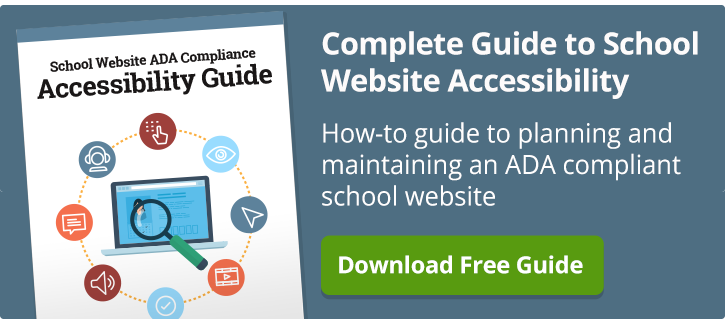True confession: I didn't used to think about website accessibility, much less school website accessibility. As a woman with no disabilities, I have never had to stop and consider my own ability to use technology, much less school website accessibility.
Then the following people came into my life: a nephew on the autism spectrum, a boyfriend with multiple sclerosis, and friends with disabilities that require assistive devices. It is a group who challenges me, motivates me and thankfully enlightened me.
As a former school district webmaster and new project manager at SchoolNow, I have a profound appreciation for website accessibility thanks to my very personal experience with people with disabilities. Some school administrators, however, may not have the luxury of the same personal and professional experience as I have had. If you are among those, I offer up the following three reasons why accessibility matters:
Website accessibility is the law
First off, as previously discussed on our blog, school districts are bound by regulations contained in Section 504 of the Rehabilitation Act of 1973 and Title II of the Americans with Disabilities Act (ADA). Districts face increased scrutiny as to how their websites and mobile apps can readily be accessed by individuals with disabilities.
Many districts face federal lawsuits; last year, the U.S. Department of Education’s Office of Civil Rights (OCR) settled website access claims in seven states and one territory.
The last thing any school communications professional, superintendent or board member wants to face is the PR nightmare of website accessibility ‘negligence’ undoing all the great things happening in their schools.
It’s the right time to make your school website accessible
From the standpoint of improving your school communications, you probably need to bring your school website up to speed technically. Perhaps it’s time for a refresh. Life cycles vary, but most new websites last from two to five years. Think of it like your cell phone: terrific at first, but unable to keep up with new features, apps, or even processing speed as time marches on.
Most importantly, how does your site work on mobile? Studies show that’s where the majority of users are heading to phones and tablets to find info on everything. Shouldn’t your website be delivering what your public needs? Unfortunately, some school communicators aren’t keeping pace with the needs of your school website users. (For help in asking the right questions of your website users, check out this article.)
Compliance, however, doesn’t have to be expensive - there are many basic things that can be done. Most difficult, actually, is developing the “muscle memory” of putting function first and foremost in all decisions. “How can our users access this (information, widget, file, photo, etc.)?” should be asked every single time content is added, updated, or redesigned on a website or mobile app.
By making accessibility a priority, your school district is showing your commitment to all audiences. Newer website technology and a good-faith effort – along with a board policy setting the tone for accessibility – not only go a long way in satisfying potential critics, but serving your website users.
Website accessibility is the right thing to do
The final reason to make your school website accessible is because it’s right. The results might be hard to measure in dollars, but they’re earned in public goodwill and trust.
Even though I'm a communicator, it took me a while to develop the rhythm of considering everyone when making a decision about technology. Another "a-ha" moment was when a former coworker said how happy she is to see image tags in my e-newsletter. Linda, who is blind, appreciates how her screen reader picks up a description, rather than just a file name.
Your users are diverse. And isn’t thorough and effective communication the real goal of your site?
Conclusion
Website accessibility matters to me now. True confession No. 2: I still remind myself about the needs of others on a daily basis.
Website accessibility matters from a legal, business, and ethical standpoint. Your district should take this opportunity to not only stay on the right side of the law, but get current with the latest technologies. In so doing, you can gain favor with many of your user groups, and help further communication by paying attention to ways you can make your district’s website accessible.
Other related articles:
- WCAG 2.0 and what it means for school website ADA compliance
- What you Need to Know about ADA compliance and Your School District
- 7 Signs your School Communications Plan is Weak
- Staying on Guard: the top 4 School Regulatory Requirements
- School Web Accessibility Starts with ADA and 508 Compliance
Topics: Communication Website accessibility School Districts

About the author
Melissa is a copywriter, editor, reader, thinker, and motivator who works for Stephens Direct, a marketing agency in Dayton, Ohio. She worked for 12 years in school public relations and digital communications and is a former product manager and project manager with Campus Suite. Reach her via LinkedIn or at melissa.fowler615@gmail.com.
.png?width=64&height=63&name=Group%20(4).png)
.png?width=66&height=64&name=Group%20(5).png)
.png?width=56&height=60&name=Group%20(6).png)
.png?width=66&height=52&name=Group%20(7).png)
.png?width=56&height=56&name=Group%20(9).png)
.png?width=59&height=52&name=Group%20(10).png)


